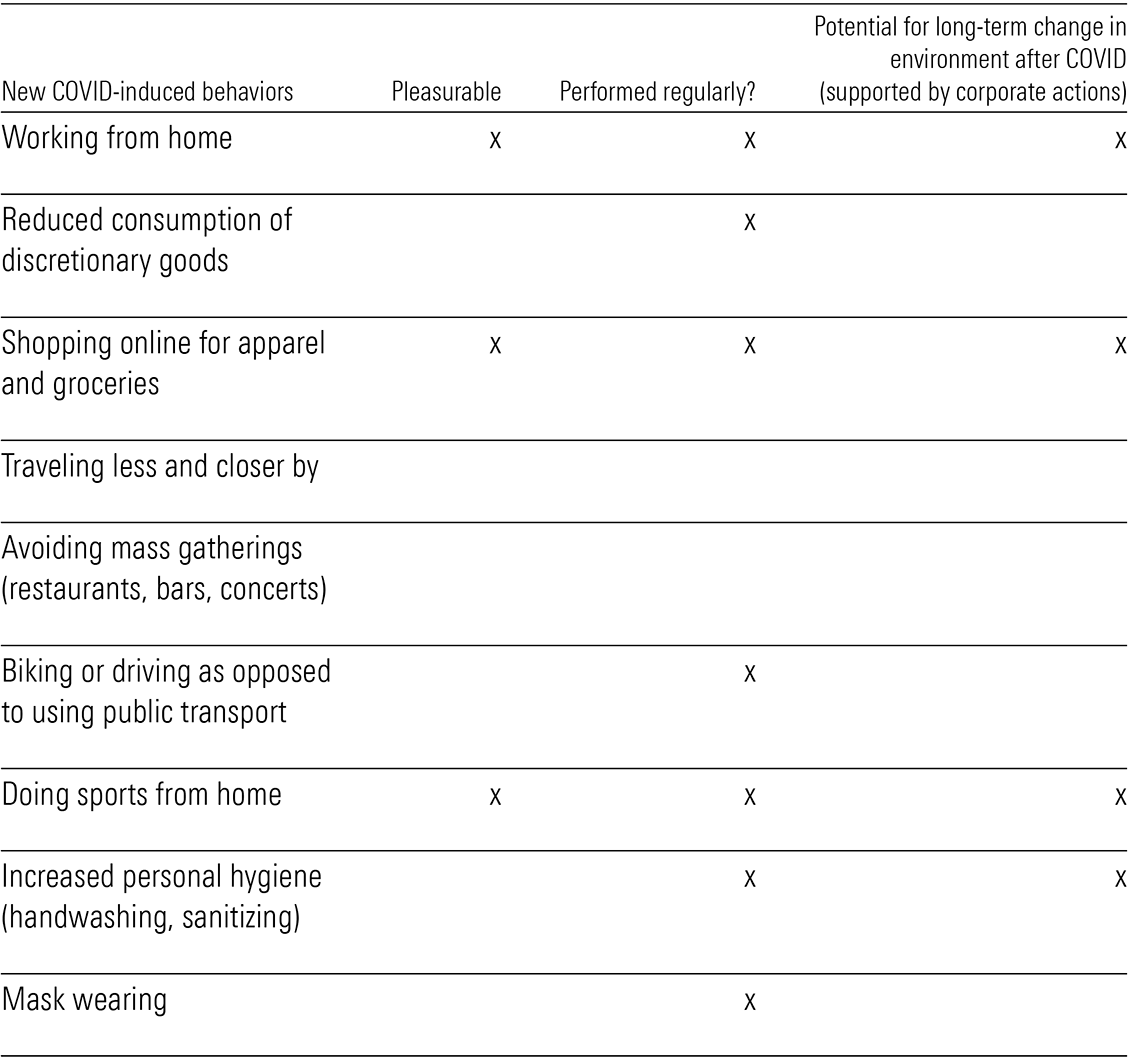Here’s how the post-covid workday will look: at the conclusion of your seventh Zoom meeting for the day, you shut the work email and associated company tabs on your work computer and visit the already open food delivery tab. You punch in an order, scheduling it to arrive in an hour or so. In the interim, you visit another tab, which features your favourite exercise slash yoga app, put in your custom settings and off you go. And at some stage during this process, you’ll wash your hands for the umpteenth time.
If this routine feels familiar, it’s probably because you’ve been observing it for a good part of the past 180 days. In other words, almost three times the amount of time it takes for a habit to form, according to that oft-cited figure of 66 days. Morningstar this week released the first in a series of reports on the world after covid-19, part of which considers the extent to which an extreme but temporary shock can alter our behaviour.
“We ranked a few behavioural changes induced by covid-19 containment measures, finding that working from home, online shopping and exercising from home may be best positioned to persist after the crisis in the form of habits,” writes lead author and Morningstar’s head of economics Preston Caldwell. Thankfully, the report suggests, abstaining from travel and mass gatherings is less likely to form a habit, given the “lower regularity of performed action, little pleasure involved in skipping these experiences, and no support from corporate action (apart from home delivery services such as Deliveroo providing some substitute for restaurant dining).”
The determinant in all this is human psychology—in short, fear. The word itself appears no less than 34 times in the report. “Fear of the next pandemic (including a covid-19 resurgence) is another psychological factor that could affect many of the same industries as changes in habits,” the report says. “Conditional on a successful vaccine being developed, the risk of catching a severe infectious disease post-pandemic won't be materially higher than it was before the pandemic started. Nevertheless, consumers have been made vividly aware of the risk, and it's difficult to predict exactly how this psychological factor will play out in shaping consumer behaviour.
"On the one hand, it seems dubious that anyone will avoid eating in a restaurant due to fear of being exposed to an emerging infectious disease. However, perhaps the largest and densest kinds of social gatherings (for example, public transit, air travel, and large events) will inspire lingering fear.” You can read more on the Morningstar report into the effect of past external shocks here.
 Source: Morningstar Premium
On that note, be sure to complete the covid-19 poll in Firstlinks this week. It’s a follow-up to the survey Graham Hand first ran in April. How have your attitudes changed? What do you think of the government's policies in relation to JobKeeper and superannuation? How will the US election change things? What will the Australian stock market do? How is your portfolio performing? What are you investing in now? When do you think the crisis will end? The poll should take about five minutes to complete, and responses will always remain anonymous. Hand will publish the full results next week.
Elsewhere this week, Emma Rapaport profiles three small-cap funds, which carry a Morningstar Gold rating. She also digs in to a new report from the Responsible Investment Association Australasia, which reveals Australian and multi-sector responsible funds outperformed mainstream funds over every time horizon—one, three, five and 10 years.
We hear from Morningstar’s David Whiston on why General Motors’ truck-making tie-up with Tesla rival Nikola is a good move.
Morningstar’s Karen Andersen reports on the latest in the hunt for a covid-19 vaccine. Resurgences in outbreaks make it clear that ending the pandemic requires more than testing, contact tracing, and social distancing, Andersen says.
If you don’t play Fortnite, you probably know someone who does. Nicki Bourlioufas explains why some asset managers argue the video games industry, the fastest growing segment of consumer entertainment, risks being overlooked.
Holly Back catches up with Morningstar’s Hong Kong-based analyst Chelsey Tam, who reveals which Chinese stocks and sectors have shone—and which have underwhelmed.
And speaking of China, in Your Money Weekly, Peter Warnes, who this week marks two decades at Morningstar, addresses Donald Trump’s talk of a potential “decoupling” with the world’s fastest growing economy and why it could backfire on the US.
Visit Morningstar's Reporting Season 2020 coverage. The calendar will be updated daily to connect you with our equity analysts' take on the financial results.
Morningstar's Global Best Ideas list is out now. Morningstar Premium subscribers can view the list here.
Source: Morningstar Premium
On that note, be sure to complete the covid-19 poll in Firstlinks this week. It’s a follow-up to the survey Graham Hand first ran in April. How have your attitudes changed? What do you think of the government's policies in relation to JobKeeper and superannuation? How will the US election change things? What will the Australian stock market do? How is your portfolio performing? What are you investing in now? When do you think the crisis will end? The poll should take about five minutes to complete, and responses will always remain anonymous. Hand will publish the full results next week.
Elsewhere this week, Emma Rapaport profiles three small-cap funds, which carry a Morningstar Gold rating. She also digs in to a new report from the Responsible Investment Association Australasia, which reveals Australian and multi-sector responsible funds outperformed mainstream funds over every time horizon—one, three, five and 10 years.
We hear from Morningstar’s David Whiston on why General Motors’ truck-making tie-up with Tesla rival Nikola is a good move.
Morningstar’s Karen Andersen reports on the latest in the hunt for a covid-19 vaccine. Resurgences in outbreaks make it clear that ending the pandemic requires more than testing, contact tracing, and social distancing, Andersen says.
If you don’t play Fortnite, you probably know someone who does. Nicki Bourlioufas explains why some asset managers argue the video games industry, the fastest growing segment of consumer entertainment, risks being overlooked.
Holly Back catches up with Morningstar’s Hong Kong-based analyst Chelsey Tam, who reveals which Chinese stocks and sectors have shone—and which have underwhelmed.
And speaking of China, in Your Money Weekly, Peter Warnes, who this week marks two decades at Morningstar, addresses Donald Trump’s talk of a potential “decoupling” with the world’s fastest growing economy and why it could backfire on the US.
Visit Morningstar's Reporting Season 2020 coverage. The calendar will be updated daily to connect you with our equity analysts' take on the financial results.
Morningstar's Global Best Ideas list is out now. Morningstar Premium subscribers can view the list here.
 Source: Morningstar Premium
On that note, be sure to complete the covid-19 poll in Firstlinks this week. It’s a follow-up to the survey Graham Hand first ran in April. How have your attitudes changed? What do you think of the government's policies in relation to JobKeeper and superannuation? How will the US election change things? What will the Australian stock market do? How is your portfolio performing? What are you investing in now? When do you think the crisis will end? The poll should take about five minutes to complete, and responses will always remain anonymous. Hand will publish the full results next week.
Elsewhere this week, Emma Rapaport profiles three small-cap funds, which carry a Morningstar Gold rating. She also digs in to a new report from the Responsible Investment Association Australasia, which reveals Australian and multi-sector responsible funds outperformed mainstream funds over every time horizon—one, three, five and 10 years.
We hear from Morningstar’s David Whiston on why General Motors’ truck-making tie-up with Tesla rival Nikola is a good move.
Morningstar’s Karen Andersen reports on the latest in the hunt for a covid-19 vaccine. Resurgences in outbreaks make it clear that ending the pandemic requires more than testing, contact tracing, and social distancing, Andersen says.
If you don’t play Fortnite, you probably know someone who does. Nicki Bourlioufas explains why some asset managers argue the video games industry, the fastest growing segment of consumer entertainment, risks being overlooked.
Holly Back catches up with Morningstar’s Hong Kong-based analyst Chelsey Tam, who reveals which Chinese stocks and sectors have shone—and which have underwhelmed.
And speaking of China, in Your Money Weekly, Peter Warnes, who this week marks two decades at Morningstar, addresses Donald Trump’s talk of a potential “decoupling” with the world’s fastest growing economy and why it could backfire on the US.
Visit Morningstar's Reporting Season 2020 coverage. The calendar will be updated daily to connect you with our equity analysts' take on the financial results.
Morningstar's Global Best Ideas list is out now. Morningstar Premium subscribers can view the list here.
Source: Morningstar Premium
On that note, be sure to complete the covid-19 poll in Firstlinks this week. It’s a follow-up to the survey Graham Hand first ran in April. How have your attitudes changed? What do you think of the government's policies in relation to JobKeeper and superannuation? How will the US election change things? What will the Australian stock market do? How is your portfolio performing? What are you investing in now? When do you think the crisis will end? The poll should take about five minutes to complete, and responses will always remain anonymous. Hand will publish the full results next week.
Elsewhere this week, Emma Rapaport profiles three small-cap funds, which carry a Morningstar Gold rating. She also digs in to a new report from the Responsible Investment Association Australasia, which reveals Australian and multi-sector responsible funds outperformed mainstream funds over every time horizon—one, three, five and 10 years.
We hear from Morningstar’s David Whiston on why General Motors’ truck-making tie-up with Tesla rival Nikola is a good move.
Morningstar’s Karen Andersen reports on the latest in the hunt for a covid-19 vaccine. Resurgences in outbreaks make it clear that ending the pandemic requires more than testing, contact tracing, and social distancing, Andersen says.
If you don’t play Fortnite, you probably know someone who does. Nicki Bourlioufas explains why some asset managers argue the video games industry, the fastest growing segment of consumer entertainment, risks being overlooked.
Holly Back catches up with Morningstar’s Hong Kong-based analyst Chelsey Tam, who reveals which Chinese stocks and sectors have shone—and which have underwhelmed.
And speaking of China, in Your Money Weekly, Peter Warnes, who this week marks two decades at Morningstar, addresses Donald Trump’s talk of a potential “decoupling” with the world’s fastest growing economy and why it could backfire on the US.
Visit Morningstar's Reporting Season 2020 coverage. The calendar will be updated daily to connect you with our equity analysts' take on the financial results.
Morningstar's Global Best Ideas list is out now. Morningstar Premium subscribers can view the list here.




